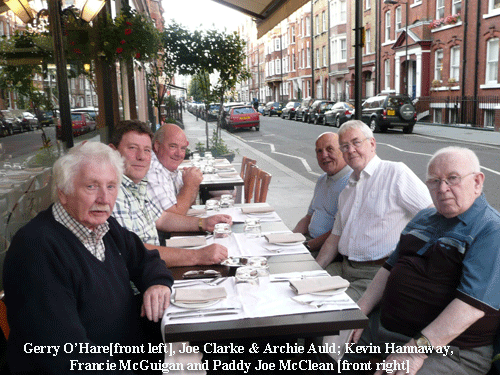Twelve-year-old County Armagh schoolgirl, Majella O’Hare was “executed” according to a former senior British officer who served in the North and is now a leading Tory MP.
MP Patrick Mercer made this startling admission at a seminar on internment at Westminster University, London, in July. Also attending as speakers were six former internees including Gerry O’Hare and five of the ‘Hooded Men’- Joe Clarke, Francie McGuigan, Paddy-Joe McClean, Kevin Hannaway and Archie Auld.
Patrick Mercer served nine tours in the North. A military historian and former BBC defence reporter, he is currently a member of the British Home Affairs Select Committee and chairman of the House of Commons sub-committee on counter-terrorism.
Delegates included about eighty academics and students at the University, as well as former British officers and the former SDLP Stormont MP Austin Currie.
The audience was enthralled as the internees related their experiences and ill-treatment by British soldiers. For the veteran republicans, being heard by a much younger and rapt audience was also a unique experience.
As PJ McClean outlined the well-documented torture that they suffered, there were looks of disbelief – which changed to wonder – as he outlined how the European Commission found Britain guilty of torture. Later the men were awarded substantial damages.
The afternoon session involved Mercer and another British officer, Jack Sheldon, answering questions from their perspective.
Sheldon was a 35-year career officer in the Queen’s Lancashire Regiment. He did four tours in the North, three emergency tours and one residential tour based at Ballykinlar, County Down. He served from December 1971 as a lieutenant and platoon commander based at Finiston School on the Oldpark Road in North Belfast and his company was responsible for the Bone, the Protestant ‘Rivers’ area and the Louisa Street peace-line.
Also answering questions in this session was Kevin McNamara, a Labour MP for 40 years and for a long time was the Labour Party’s ‘Northern Ireland spokesman’; and Ken Bloomfield, who at the time of the introduction of internment was deputy secretary to the North’s cabinet. He went on to become the head of the Northern civil service and, in 1997, the North’s first Victims Commissioner.
It was during this discussion that Mercer made his statement about Majella O’Hare.
After the sessions, students button-holed the internees and fired question after question. Some initially expressed doubts about the claims of torture but were forced to reluctantly accept their veracity. Amongst questions the internees faced were those focusing on why all the internees, with the exception of Gerry O’Hare, were found at their own homes in the initial round-up on August 9th, 1971. Why, they wondered, were active IRA members confident enough to be living at home at all? There was an explanation: after a previous series of raids and arrests earlier in the summer which had led to a major political row, few believed the authorities would go ahead with full-blown internment. Some, more cautious republicans, had, indeed, heeded warnings not to stay at home – while others had been lulled into a sense of false security.
They were also quizzed on the reasons why they were each individually selected for what was euphemistically called ‘deep treatment. That was as much a mystery to the internees as to the audience because, for example, Paddy-Joe McClean was a civil rights activist and a well-known opponent of IRA methods.
Another question was whether, if they considered themselves soldiers, it amounted to ‘a fair cop’ for Crown Forces to arrest them?
Every volunteer, the audience was told, was warned when he/she joined that imprisonment was one outcome.
A focus of interest was whether Long Kesh amounted to a ‘University of Terrorism’ and, as ever in discussions about the prison experience, the students and University staff were fascinated by stories of escape attempts, including that by Francie McGuigan in 1972 from the internment camp.
The students were told of the achievement over the years by prisoners, many of whom emerged from jail with degrees in humanities, languages and social sciences.
There were no takers for one question: whether Unionist Prime Minister Brian Faulkner really believed the RUC claim that there were no Protestant/loyalist subversive organizations, and thus his decision only to intern nationalists and republicans. There may have been no takers – but there were plenty of loud guffaws.
The audience was also interested in the lessons for today and whether the experiences of internment in the North can inform contemporary counter-insurgency strategists.



